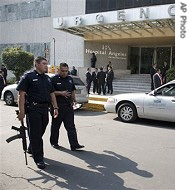
|
 |
 |
 News Around the Republic of Mexico | May 2008 News Around the Republic of Mexico | May 2008  
Mexico Wages Bloody War With Drug Cartels
 Greg Flakus - VOA Greg Flakus - VOA
go to original


| | Federal police officers patrol the entrance to the hospital where Mexico's acting Federal Police Chief Edgar Millan Gomez died in Mexico City, 08 May 2008. | | |
In Mexico, President Felipe Calderon continues his fight against powerful drug cartels as the death count mounts. More than 1,300 people have died this year in Mexico in violence connected to the illicit drug trade. In recent weeks some high-ranking police officials have been targets of drug gangs, leading some analysts to wonder whether the Mexican government or the criminal gangs will win the fight.

Since taking office in December 2006, President Calderon has sent 25,000 Mexican troops into the field in an all-out battle with drug trafficking cartels. He says the sovereignty of the nation is at stake.

He vows to keep up the fight against those who threaten the state, especially the criminal organizations.

But the stakes in the fight have gone up since the May 8 murder of Edgar Millan Gomez, chief of the Mexican Federal Preventive Police, who was gunned down at his home in Mexico City.

Political analyst George Friedman, who heads the Stratfor private intelligence company in Austin, Texas, says Mexico could become a failed state if the government does not make a strong counterattack on the drug cartels.

"If Calderon does not respond effectively to this killing, any minister of his government is going to see himself at risk and that is going to change their behavior," said George Friedman.

Friedman says Mexico could turn into the kind of battleground that existed in Colombia in the 1980's when drug cartels held sway over several cities and operated with impunity. He says the private armies of the Mexican drug cartels resemble the militias that have undermined governments in other parts of the world.

"What we are seeing in Mexico looks more like Lebanon, which are militias that are stronger than the Lebanese army," he said. "This issue that we are facing here today is can the Mexican state with all of its power outfight the militias of the cartels? Now, it is not clear that they cannot, but, at this moment, it is also not clear that they can and that is really the crisis that is facing Mexico."

President George Bush is trying to help Calderon with a package of aid and training that came out of a meeting between the two leaders last year in Merida, Mexico. Bush's request has been reduced by the U.S. House of Representatives and has yet to pass in the Senate, but the president continues to support it.

"We are working hard to reduce demand for drugs here in America and, at the same time, we want to work in conjunction with strong leaders to make sure these drug traffickers do not get a stronghold and that is why it is important for Congress to fund the Merida project," said President Bush.

But George Friedman says even if the $400 million in aid currently in the proposal is approved, it may be too little, too late.

"It puts the United States on the line in Mexico without anywhere near sufficient resources to make a decisive difference in a short period of time,"noted Friedman.

Friedman says, however, that the stakes are high for the United States in any case because violence in Mexico is bound to spill over the border and disrupt vital trade between the two nations.

If Mexico's government were to be overwhelmed by the drug gangs, Friedman argues, there would be people in both the United States and Mexico favoring direct US intervention. That would undoubtedly stir Mexican nationalist resentment over past incursions by the United States. But, he says, that is not the only reason the United States should avoid such a drastic action.

"The problem is I don't know that an American intervention would work," he said. "As we saw in Iraq, putting 125,000 troops into a country of 25 million is not a particularly effective solution. Mexico is a country of over 100 million. I don't know if the US has the resources to impose a settlement."

Friedman says the drug cartels are powerful because of the estimated $40 billion they take in each year from narcotics smuggling. He says legalization of drugs in the United States would deprive them of that profit. But he says that is politically unacceptable in the United States at this time. The other option is to reduce demand through drug treatment programs and campaigns against drug use, but he says decades of trying those approaches have failed to have much effect. | 
 | |
 |



